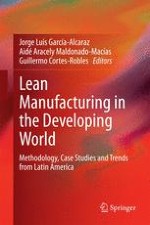2014 | OriginalPaper | Buchkapitel
25. Techniques and Attributes Used in the Supply Chain Performance Measurement: Tendencies
verfasst von : Liliana Avelar-Sosa, Jorge Luis García-Alcaraz, Miguel Gastón Cedillo-Campos
Erschienen in: Lean Manufacturing in the Developing World
Aktivieren Sie unsere intelligente Suche, um passende Fachinhalte oder Patente zu finden.
Wählen Sie Textabschnitte aus um mit Künstlicher Intelligenz passenden Patente zu finden. powered by
Markieren Sie Textabschnitte, um KI-gestützt weitere passende Inhalte zu finden. powered by
